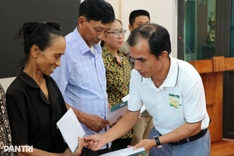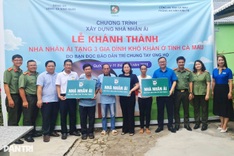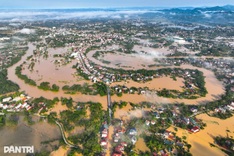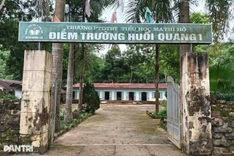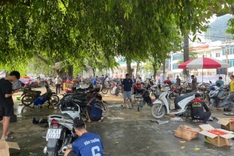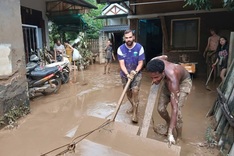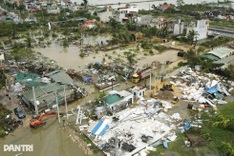Last week, Danish journalist Merete Jensen wrote for DTiNews on how poachers in Cat Tien National Park turned became eco-tourist guides. She now ventures further towards the south of Vietnam to see how climate change has affected farmers and the environment.
Valuable export profits
Salt water intrusion caused by climate change has prompted thousands of small scale farmers around the Mekong Delta to produce shrimps instead of rice. Despite the fears that the country’s food security might be at risk, it is not all bad news for the farmers or for the environment.
Lam Ba Tai used to harvest rice three times a year in the muddy field next to his little wooden house in U Minh District, the southernmost Vietnamese province of Ca Mau. Now he barely has time to harvest one crop of Vietnam’s traditional staple before rain creates flooding, breaks down dikes and lets in saltwater from the sea, which in less than one week turns an otherwise healthy paddy yellow and dying.
Like so many other destitute Mekong Delta farmers, Lam Ba Tai was at first distressed about the damaged paddies. He has now turned the changing weather pattern, which experts and statistics blame on global climate change, to his advantage.

Mangrove along certified organic shrimp ponds.
Having previously earned very little from his rice harvests, and sometimes even having had to sell it at production cost without any profit at all, he now earns VND 30 to 50 million ($1,600 - $2,700) per hectare breeding shrimps for export to European supermarkets in the wet season, producing only one harvest of rice in the dry season.
“I could see that other farmers in the area earned a good income from rotating rice and shrimps. If you only breed shrimps you risk diseases, and if you only have rice you earn very little,” says Lam Ba Tai, adding that since 2000 local farmers have had more money and the development of the area has intensified.
Despite bringing prosperity to the locals as well as valuable export profits to the country, some fear the extensive shrimp breeding in the vast Mekong Delta will be a threat to the food security of Vietnam and its neighbours. Vietnam is among the world’s top rice exporters, and 90 percent of the exported rice is harvested in the delta, which appropriately goes by the name, "Vietnam's rice bowl."
With water rising approximately one metre above sea level, the whole of the Mekong Delta is at risk as global climate change has brought along severe storms and unpredictable weather. Furthermore, in the quest to breed shrimp, local farmers have undermined the dikes. According to the international wildlife group WWF, many have also cut down clusters of mangrove to place shrimp ponds near the coast – mangrove which has for decades been recognised as the single most important safety measure against storms wreaking havoc on the coastline.
“Great swathes of mangrove forests have been replaced by diked ponds for shrimp production for global markets,” says Tuong Phi Lai, aquaculture programme officer of WWF.
“It has brought new wealth to the province where 30-40 percent of people live below the poverty line, but it has also degraded Ca Mau’s resistance to destructive storms.”
Not only the rising sea levels can be noticed, but the loss of mangrove and the intrusion of salt water can also be seen.
“In the past we only had rice here,” says deputy chairman of U Minh Commune Vo Va Lieu: “But now it is difficult to grow rice because of the salt intrusion and the change in the rain patterns. This year farmers only harvest 70 percent of what they gained last year because of failing rain and salty water.”
Vo Va Lieu cautions that nobody knows how the long term consequences of the salt intrusion will affect fruit trees and other vegetation in the area, but he admits farmers have very little incentive to go back to producing rice, even if the dikes will be repaired to keep out the salt water, since they can gain a much higher profit from the shrimps – with less effort put into the production.
“Years back this area was over-salted, but the government built the dikes in order to keep out the salt water and enable farmers to grow rice to sustain the needs of Vietnam’s growing population. Many farmers have now illegally broken down dikes and converted from rice to shrimps,” he says.
Replying to questions about actively breaking down dikes to let salt water into the river system and onto the fields, rice and shrimp farmer Lam Ba Tai says that as far as he knows, it is a legal practice.
“If the government wants to bring the area back to fresh water, I will shift to rice and fresh water fish,” he affirms.

Lam Tuyet Le and her family have benefitted economically from organic shrimp farming.
Environmental gain
Not only shrimp farmers are reaping the benefits from fields being inundated by salt water. Ironically, the environment also gains from the rice farmers’ shift to rotation farming practices.
Lam Ba Tai quickly realised that he needed to cut out the pesticides in his paddy field in order for his shrimp to survive, and as the shrimp give nutrients to the paddy, this in turn feeds the shrimp, the two crops can than be produced in a healthy rotation without the use of any fertiliser, pesticides or feed, thus saving the soil from tons of chemicals.
Local authorities are also encouraging farmers to shift to organic shrimp, which are in high demand on the European market, and can be sold at a 25 percent increased price.
In Ca Mau’s Nam Can District, director of Department of Agriculture and Rural Development, Huynh Thuc Binh, says that all other economic activity in the district derives from the shrimp.
He is now asking WWF for assistance to expand the district’s existing 3600 hectares of certified organic shrimp ponds to 10.000. However much this may sound, it is but a drop in the salty sea:
Ca Mau is by far the largest shrimp producer in the delta, with a shrimp farming area of more than 250.000 hectares – covering half of the geographical area of the province.
“Years back mangrove forest covered the province,” says Huynh Thuc Binh. “The government’s priority is to expand the mangrove area in combination with shrimp farming,” he adds.

Lam Ba Tai shifted to rotation farming practices harvesting one crop of rice and one crop of shrimp every year, when saltwater inundated his paddy field, ruining the nearly ripe crop of rice.
In 2006 WWF initiated the so called Shrimp Aquaculture Dialogues in order to develop standards for responsible shrimp farming. With the encouragement and technical assistance from WWF the organic shrimp co-operative Forestry Enterprise No. 184 in Nam Can district has already begun planting mangrove along the shrimp ponds and river beds. The focus of the project is to save the mangrove while offering local farmers a livelihood as well as an incentive to care for nature.
“It is mandatory for mangrove to occupy half of the area, which also eliminates the risk of diseases and brings the survival rate of shrimps up. At the same time the production form prohibits rubbish, feed, pesticides, fertilizer and medicines, explains WWF’s Tuong Phi Lai:
“It secures a stable income for the farmers and a sustainable production. And it is a step in the right direction toward a better environment in the Mekong Delta.”
Lam Tuyet Le’s husband is out planting mangrove saplings as we come to her house to ask about the family’s experience with organic shrimp farming.
“I am only a housewife, I don’t know about farming,” she excuses herself. The young mother does however concede that along with the growth of the mangrove, the family’s economy also develops:
“With the money from the shrimps we can feed our children better and send them to school or to the hospital. We have even start saving a bit of money now.”
* Next week: Merete Jensen explores how people of the Mekong Delta live with the consequences of dying mangrove, salt water inundating their paddy fields, and storms ripping their houses apart, although they may not have heard about climate change.


